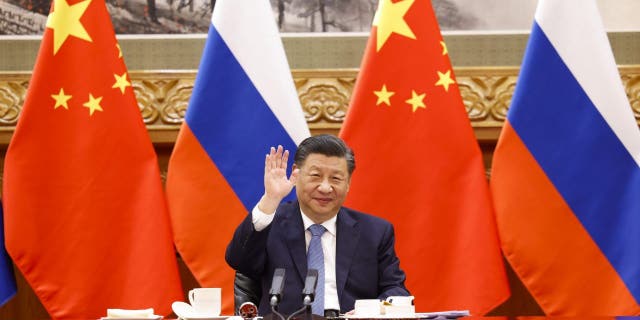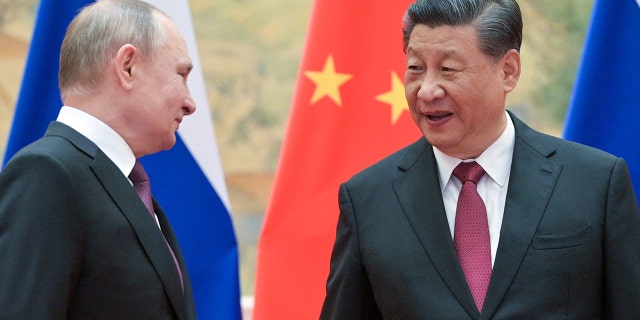Ukraine conflict ‘heightens the risk’ of Chinese-American war, professor says
The conflict in Ukraine “heightens the risk” of war between China and the U.S., a political science professor told Fox News.
Michael Beckley, an associate professor of political science at Tufts University, said China could take action in Taiwan while the U.S. is distracted with Russia’s siege on Ukraine. He said conflict between the U.S. and China would most likely break out if the authoritarian superpower were to take military action in Taiwan.
“The United States and China, I think, are at very high risk of conflict,” Beckley, the co-author of the upcoming book “Danger Zone: The Coming Conflict with China,” told Fox News. “Not just economic competition or ideological competition, but an actual war.”
Beckley told Fox News that a slowing Chinese economy, rising sentiments of Taiwanese independence and increasing international pressure to contain China’s growth make conflict more likely.
Professor Michael Beckley, co-author of "Danger Zone: The Coming Conflict with China"
“There’s a lot of chatter suggesting that if China is going to move on Taiwan that now would be the opportune time,” Beckley told Fox News. “The Russia conflict plays into this because of course it’s a big distraction for the United States.”
In October, President Biden pledged to defend Taiwan if China attacked.
The U.S., under the Taiwan Relations Act, provides defensive weapons to Taiwan, but it is not obligated to provide military support if China were to invade.
President Xi
(Huang Jingwen/Xinhua via AP))
Beckley told Fox News that the conflict in Ukraine limits the resources the U.S. can dedicate to protecting Taiwan from China.
“If Russia and China are each fighting back-to-back in their own regions, that’s going to overstretch American forces, give them each opportunities to make inroads in their own regions and I think heightens the risk of a conflict over something like Taiwan this decade,” Beckley told Fox News.
Beckley also noted that Russia and China share mutual interests based “based on geopolitics, on energy, and on a common ideological aversion to the current international system.”
Beckley called trade between the two nations a “natural partnership based on an absolutely vital commodity.” China imports over 80% of the oil and natural gas that it consumes and over half of Russia’s government revenue stems from selling gas and oil to foreign countries, according to Beckley.
The two countries also share an interest in “pushing back against the liberal international order that the United States and its mostly democratic allies sustain,” Beckley said.
The Chinese-Russian relationship features an “asymmetry in power” based on China’s military and economic might, according to Beckley.
“China’s economy is 10 times the size of Russia’s,” Beckley told Fox News. “China spends four times as much every year on its military as Russia does, and China is really a multi-dimensional, great power.”
“As a result, Russia is always worried of becoming the junior partner in the relationship, and China is always worried that it will give more than it gets,” Beckley continued.
Vladimir Putin and Xi Jinping
(Alexei DruzhininTASS via Getty Images)
Beckley added that there are schisms in Russia and China’s geopolitical interests including border disputes, Central Asian spheres of influence and historical hostilities.
Chinese financial interests counter Beijing’s diplomatic support of Russia, according to Beckley. Chinese banks have “walked back” some of their transactions with Russia in “basic, tacit compliance” with recent sanctions.
“China, on the one hand, wants to support Russia but is not willing to go to the full extent as an ally would because it worries that it’ll get cut off from the Western economic system and invite hostility towards itself,” Beckley told Fox News.
China has not imposed sanctions on Russia, according to Reuters.
Beckley told Fox News that there are three strategic rationales for this policy.
“First of all, I think the Chinese are worried that if they are to make moves on Taiwan or to get more aggressive or simply a spark the ire of the United States and its allies, they too could be subject to similar sanctions,” Beckley said. “And so they want to start undermining the legitimacy of this sort of ganging up on a great power.”
Second, Beckley told Fox News that abstaining from imposing sanctions allows Chinese institutions to avoid getting “caught up in a broader conflict.”
Third, “the more trouble Russia can stir up in Europe, the more America’s attention and its allies are bogged down in Europe,” Beckley said. “And that softens up the international system so that China can potentially blast through it if it wants to make its own offensive in East Asia.”
Source: Read Full Article











